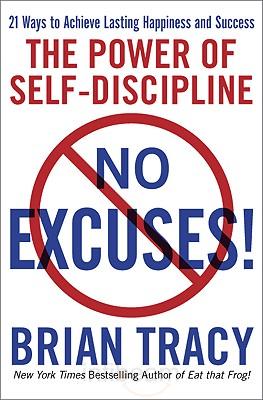What’s the secret of success?
Self-discipline, of course. At least that’s what self-help guru Brian Tracy claims in No Excuses! 21 Ways to Achieve Lasting Happiness and Success. Tracy’s latest book describes how you can use self-discipline to become a successful, “superior” person in 21 areas of your life.
Yes, Tracy does occasionally use the rather Nietzschian language of “superior people” vs. “weak and irresolute people.” But his advice throughout No Excuses is so sound, and the book is so readable, that Tracy may just convert you into a self-disciplinarian by the last page. He certainly had me interested long before that.
What’s Inside No Excuses
Tracy quotes Elbert Hubbard to define self-discipline as “the ability to do what you should do, when you should do it, whether you feel like it or not.” He tells you how to employ self-discipline in 21 well-organized, easy to follow chapters. These chapters are clustered into groups of seven, which in turn make up the three parts of the book.
Part I covers self-discipline and personal success. This part covers things like goals, courage, and persistence, and how self-discipline helps you master them. Part II tells you how to use self-discipline in business, sales, and finances. Part III talks about quality-of-life issues like personal health, fitness, and marriage, and how you can use—you guessed it—self-discipline to achieve success in those areas.
Each chapter features a number of end-of-chapter exercises to get you moving in the right direction. Unlike many other books I’ve read, these exercises are good. Tracy truly helps you figure out where you are in each area of your life, and what you need to do to find success. If you do all the exercises in the book, you’ll make book worth your time and money.
Likes and Dislikes
Overall, I give No Excuses a ready thumbs-up. Tracy does a fine job of offering simple definitions of oft-foggy concepts like leadership, time management and character. He then tells you how to cultivate them using the secret sauce of self-discipline. Throughout the book, he uses studies, anecdotes, business concepts like the 80/20 principle, and self-help ideas like the Law of Attraction to support his points. It’s an easy but profound read.
Two things about No Excuses gave me pause, although I don’t believe they affect the quality of Tracy’s advice. One, Tracy uses a lot of universal language without necessarily backing up where he got all of his ideas. “The Law of Concentration says that ‘whatever you dwell upon grows and increases in your life’” and “the core virtue of character is truth” are examples from the book. Perhaps it’s self-help guru syndrome, but I did find myself wondering what gives Tracy, even with his years of study and experience, the authority to tell me what I should be doing in everything from my career to my marriage.
When I browsed Tracy’s website to find out more about him, I discovered that he’s actually a man of faith. This may explain that “universal truth” angle I picked up in some places.
Onto my second point, or digression, however you may classify it. Tracy’s self-discipline reflects a well-honed Protestant work ethic. He advocates that you have, at the least, a full and productive day. After getting enough sleep, he writes that you should read something uplifting before getting out of bed. After reading, you get up and exercise. Then you go to work an hour early, work through lunch, and leave an hour late. Every day.
I can’t imagine being relaxed, living like that. But there’s little in the book about managing stress. I can only assume that what makes this kind of heavy schedule tolerable is the right mindset. That kind of mindset is really hard to cultivate, unless you had fabulous parents, or you’re religious. And I can’t help but think that for Tracy, that mindset is supported by God, though he doesn’t mention anything about faith or religion in the book. A minor gripe, considering that it’s a good book overall, but I’d feel remiss not to mention it.
Conclusion
No Excuses is a very good self-help tome. It’s motivational by virtue of being simple, effective, and, I’m guessing, quite true. I’d recommend it across the board, especially if you’re itching to get your act together.
Disclosure: We were sent a free copy of No Excuses.

